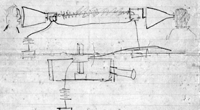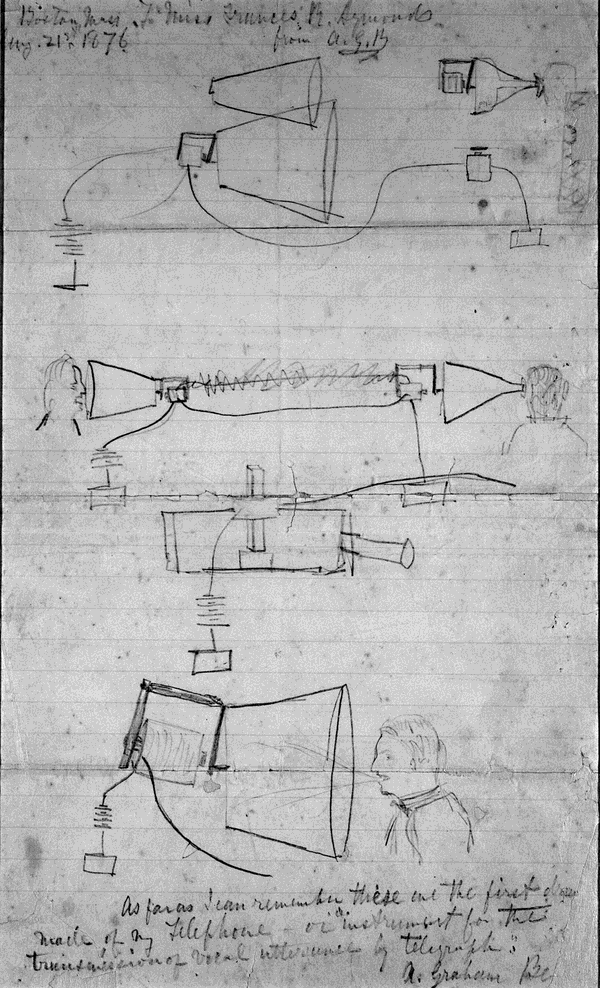Yesterday marked the 150th anniversary of a fickle finger of fate. On July 31, 1871, inventor Antonio Meucci was severely injured in a steam boiler explosion aboard the Staten Island ferry Westfield. The disaster left 100 people dead and Meucci convalescing at home during a pivotal time of his life.
Less than a year before, Meucci had invented what he called a telettrofono – an electric telephone. Already financially struggling, he chose not to patent that invention – a $250 cost – choosing instead to file a $20 caveat (warning). After the ferry accident he was even poorer; his wife took charge of their finances and sold the working models of his telephone to pay the bills. He must have been in bad shape not to know what his wife had done, and discouraged when he found out.
Nevertheless in 1872, he was encouraged by potential partners to continue his experiments, suggesting that he approach a local telegraph company to use their wires to transmit spoken words. Supposedly, Meucci left his drawings and possibly a rebuilt prototype of his telephone with the telegraph company owner and awaited feedback. While he waited, he dabbled in other projects. In 1873, he filed a patent for a food condiment (“sauce”); in 1874, he filed a caveat for refining crude oil. That year, finally deciding to wait no longer, Meucci returned to the telegraph company demanding his apparatus back. He was told, everything had been lost or misplaced. Again, the fickle finger of fate…or was something nefarious going on? His telephone project went on the back burner.
In 1875 he developed a coffee filter and some kind of kitchen utensil. That same year he filed a patent for a “lactometer” to detect adulterations in milk (Pasteurization only started in the 1880s.) and designed some new barometers. On December 28, 1875, Meucci’s telephone caveat expired without him renewing it. It seemed doomed anyway, right?
On March 7, 1876 a guy named Alexander Graham Bell received a patent for his telephone. That’s when the fireworks began.
Everyone knew that the telephone would be a household necessity. In fact, Bell Telephone spent the next eleven years suing anybody who tried to get into the telephone business – over 500 different companies and individuals including Antonio Meucci. The Italian was named in Bell’s suit against the Globe Telephone Company, a trial that Meucci eventually lost after reaching the U.S. Supreme Court in 1887. Two years later, he died at age 81.
Part of Meucci’s problem was his lack of command of English. We don’t know if he used a translator or tried to explain his work himself. The opposition tried to explain the telettrofono as nothing more than two cans connected with wire. Meucci’s knowledge of electricity and magnets far exceeded Bell’s, whose expertise was in speech therapy. Meucci had even developed electro-magnetic treatments for physical ailments. I suspect that Thomas Watson, Bell’s assistant, was the key to Bell’s success. He was a machinist who resigned from Bell Telephone at age 27, taking his profits to launch a successful shipbuilding company. He must have translated Bell’s visions into reality, or he could have reproduced purloined Meucci plans – who knows? Check out the drawings below to compare Meucci’s expertise to Bell’s.


No doubt, xenophobia also played a role in how judges and courts viewed Meucci’s case. Alexander Bell was also a foreigner (Scots/Canadian) but a native speaker of the appropriate social class. His high-level contacts and access to deep pockets gave him quite an advantage over Meucci.


The Italian government and the Italian American community have gone to bat for the historical Meucci. His name is still alive and linked to questions about Alexander Graham Bell. Today’s telephone has many fathers – it was freed from copper wires thanks to Guglielmo Marconi, “Master of the Ether.”
And, all these inventors who did their work on American soil, can thank another fickle finger. For, on July 31, 1492, Christopher Columbus began his courageous voyage West. -JLM




Recent Comments